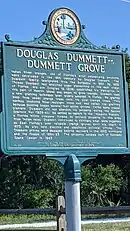| Mosquito Roarers | |
|---|---|
 Dummett Grove historical marker which notes his involvement with the Mosquito Roarers | |
| Active | 1835 - 1840s |
| Country | Florida Territory |
| Allegiance | United States of America |
| Branch | Florida Militia |
| Type | Militia |
| Size | Company |
| Engagements | Second Seminole War |
| Commanders | |
| Notable commanders | Maj. Benjamin Putnam Lt. Dummett |
The Mosquito Roarers were a Florida militia consisting of residents working in or near many of the sugar plantations of coastal Mosquito County, from present-day Hillsborourgh County to Volusia County. Called into service during the Fall of 1835, the militia became Company B of the Florida militia.[1] They were involved in battles against the Seminole people.
History

The regiment's commanding officer was Major Benjamin Putnam[2][3] and companies were commanded by Lt. Douglas Dummett, the son of a local Halifax River plantation owner,[4] James Ormond II, whose family Ormond Beach, Florida is named for,[5] and Colonel Joseph Sanchez.[1]
On December 21, 1835 the Mosquito Roarers, along with other companies, arrived at an outpost on the Tomoka River named Rosetta (named for the Rosetta Plantation owned by John Moultrie). Seminole Indians began later that month attacking plantations throughout New Smryna, Florida and the rest of Mosquito County.[6][7]
On New Years eve of 1835, the Mosquito Roarers were present and took part in the Battle of Ouithlacoochie along the Withlacoochee River in present-day Citrus County, one of the first major battles of the Second Seminole War. The Mosquito Roarers aided in providing cover for the US Army as their troops ferried themselves and supplies across the banks.
On January 17, 1836 the Mosquito Roarers were involved in another confrontation with the Seminole Indians on Dunlawton Plantation in present-day Port Orange, Florida. This skirmish was eventually put to an end when Coacoochee arrived with more Seminoles and forced the Mosquito Roarers to retreat.[8]
After the conclusion of the Second Seminole War, the Mosquito Roarers remained relatively active as support for local sheriffs and law enforcement when hunting criminals and stopping disturbances.[1]
References
- 1 2 3 Andrews, Mark (July 21, 1996). "Mosquito Roarers Militia Saw Action In Battles of Second Seminole War". Orlando Sentinel.
- ↑ Taylor, George (February 23, 2013). "Battle of Dunlawton Plantation Marker, Port Orange, FL". George Lansing Taylor Collection Main Gallery.
- ↑ "Marker Detail: Battle of Dunlawton Plantation". Florida Historical Markers Programs, Florida Division of Historical Resources, Florida Department of State. Retrieved 2021-12-21.
- ↑ Taylor, George (March 12, 2020). "Ormond Tomb Marker Volusia Co, FL". George Lansing Taylor Collection Main Gallery.
- ↑ "Marker Detail: Ormond Tomb". Florida Historical Markers Programs, Florida Division of Historical Resources, Florida Department of State. Retrieved 2021-12-21.
- ↑ Sheldon, Jane Murray (1929). "Seminole Attacks Near New Smyrna, 1835-1856". Article 5. The Florida Historical Quarterly. 8 (4).
- ↑ "Dec. 26, 1835: Second Seminole War, Largest Uprising of the Enslaved; Zinn Education Project". www.zinnedproject.org.
- ↑ Bittle, George C. (July 1967). "First Campaign of the Second Seminole War". The Florida Historical Quarterly. 46 (1): 43–44. Retrieved 10 March 2023.